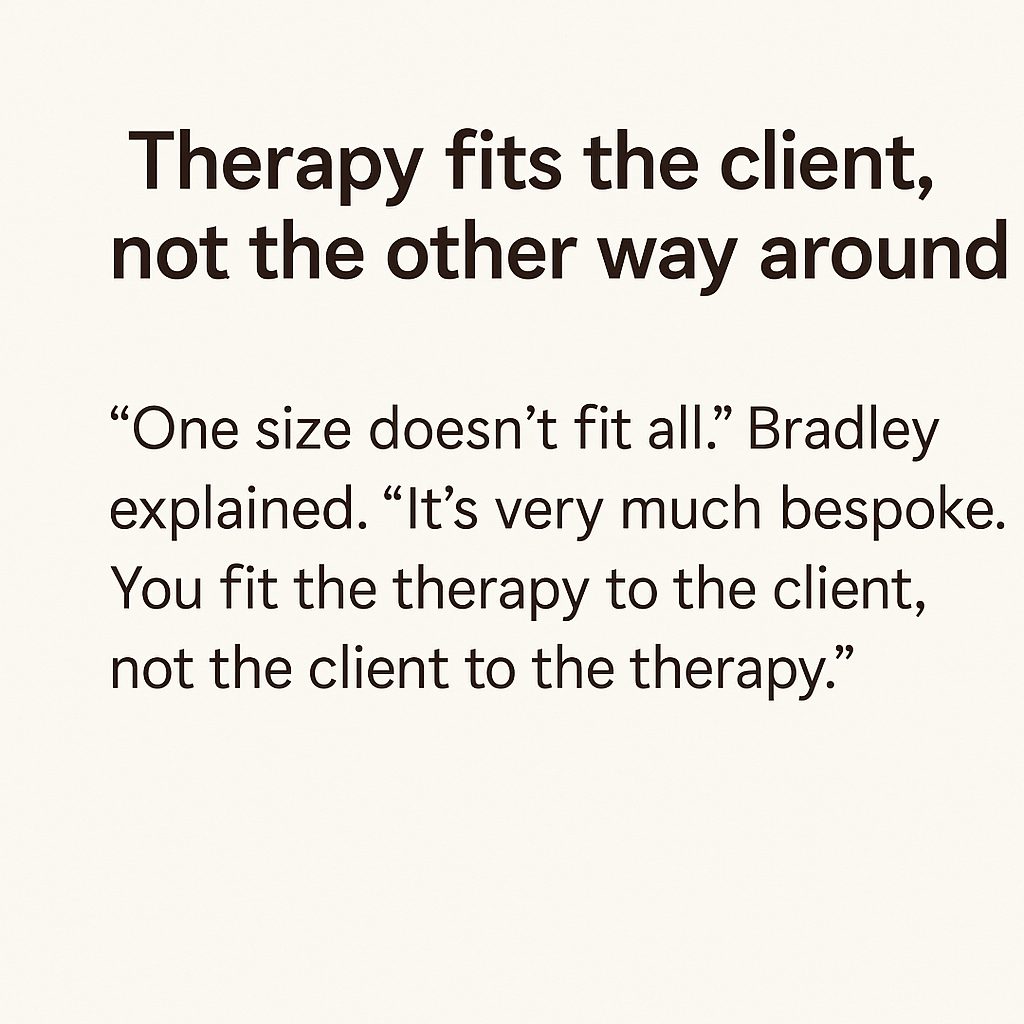(With insights from therapist Bradley Riddell)
Therapy can feel daunting if you’ve never tried it. In this week’s Mindful Learning Podcast, I spoke with therapist Bradley Riddell about what therapy really involves, how it can help, and why it’s worth exploring. Below are seven takeaways from our conversation, each linked to wider research and practice.

1. Therapy fits the client, not the other way around
“One size doesn’t fit all,” Bradley explained. “It’s very much bespoke. You fit the therapy to the client, not the client to the therapy”.
This reflects what Aaron Beck argued when he developed cognitive therapy — that therapeutic techniques must be responsive to each person’s presenting issues rather than applied dogmatically (Beck, 1976). Similarly, Janina Fisher (2017) emphasises that trauma work must adapt to the client’s pace and capacity.
2. Don’t be afraid to shop around
“Don’t be shy about interrogating the therapist,” Bradley advised. “Find out what their modality is, what their paradigm is, what they were trained in, what their qualifications are… A good therapist will be fine with that”.
Research shows that the “therapeutic alliance” — the quality of the relationship between therapist and client — is a stronger predictor of outcomes than the specific model used (Norcross & Lambert, 2019). That’s why Bradley encourages people to ask questions and make sure they feel comfortable before committing.
3. Therapy takes time — but sometimes not as long as you think
“On average, it would take between six and twelve sessions to establish an end,” Bradley said. “But in some cases clients have come to me and within two or three sessions have said, Do you know, I’m where I need to be now”.
This echoes Albert Ellis’s (1962) insight in rational emotive behaviour therapy that change can happen surprisingly quickly if core beliefs are challenged effectively. But as Michael Yapko (2012) argues in his work on clinical hypnosis, deeper or more complex issues often require sustained exploration.
4. Therapy is about building rapport
Bradley stressed the importance of respect and trust:
“Being in the room, you’re already leading the client to a collaborative venture… If you don’t respect the sanctity of the person sitting in the chair with you, you’ve no business being in the therapist’s chair. A lot of good therapy is about acceptance. Every addiction, every difficulty, is an attempt to meet an unmet need. Therapy is about guiding the client to understand their own process”.
This principle resonates with humanistic traditions such as Carl Rogers’s person-centred therapy, which placed unconditional positive regard at the heart of therapeutic change (Rogers, 1961).
5. Childhood may come up — but only if it helps you
“I don’t need to talk to them about what happened as children,” Bradley said. “If they want to, that’s OK. But I certainly wouldn’t force it”.
Janina Fisher’s trauma-informed work highlights that the past can surface if it is alive in the present, but retraumatising clients by forcing exploration is counterproductive (Fisher, 2017). The key is sensitivity: the therapist follows the client’s needs, not their own agenda.
6. Humour has a place in the therapy room
When working with clients struggling with alcohol, Bradley sometimes reframes their history as a “drinking career”: “When did you get promoted to six pints a night because you started off at two?”.
This kind of humour connects with the human givens approach (Griffin & Tyrrell, 2004), which encourages reframing unhelpful patterns in ways that open up new possibilities. Used carefully, humour can reduce shame and make difficult topics more discussable.
7. Therapy is about discovering resources you already have
Bradley explained that therapy helps people “access resources available to them in the outside world” as well as their inner resilience.
This reflects a core tenet of many contemporary approaches, from solution-focused therapy to positive psychology: that people already have strengths, skills, and social networks that can be mobilised (Seligman & Csikszentmihalyi, 2000). Therapy provides the space and support to uncover and use them.
Final thought
As Bradley reminded me: “It really is about meeting a client where they are”. Whether you’re facing addiction, anxiety, or simply uncertainty, therapy can be a powerful way to make sense of your life, build resilience, and rediscover your own capacity to cope.
You can learn more about Bradley Riddell MBACP from his website here: www.addiction-counselling.org.uk, where you can also find his contacts details too.
References
- Beck, A. T. (1976). Cognitive Therapy and the Emotional Disorders. New York: International Universities Press.
- Ellis, A. (1962). Reason and Emotion in Psychotherapy. Secaucus, NJ: Lyle Stuart.
- Fisher, J. (2017). Healing the Fragmented Selves of Trauma Survivors: Overcoming Internal Self-Alienation. London: Routledge.
- Griffin, J. & Tyrrell, I. (2004). Human Givens: A New Approach to Emotional Health and Clear Thinking. Chalvington: HG Publishing.
- Norcross, J. C. & Lambert, M. J. (2019). Psychotherapy Relationships that Work (3rd ed.). Oxford: Oxford University Press.
- Rogers, C. (1961). On Becoming a Person: A Therapist’s View of Psychotherapy. Boston: Houghton Mifflin.
- Seligman, M. E. P. & Csikszentmihalyi, M. (2000). Positive psychology: An introduction. American Psychologist, 55(1), 5–14.
- Yapko, M. D. (2012). Trancework: An Introduction to the Practice of Clinical Hypnosis (4th ed.). New York: Routledge.


Leave a Reply